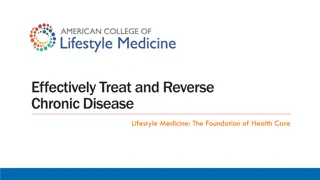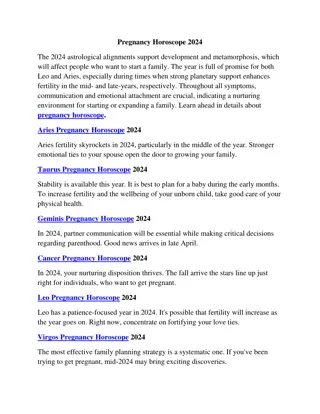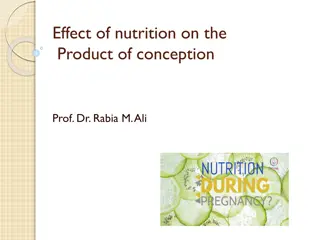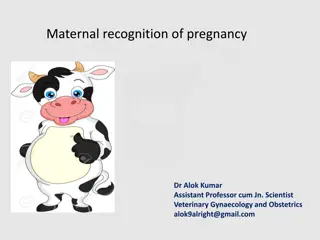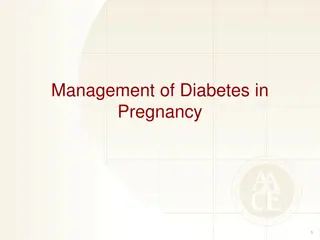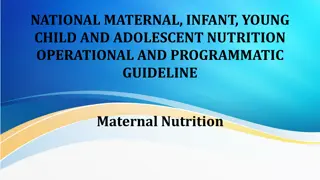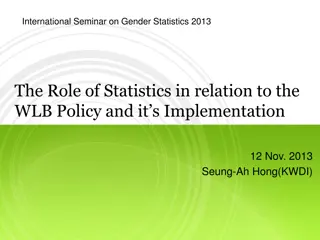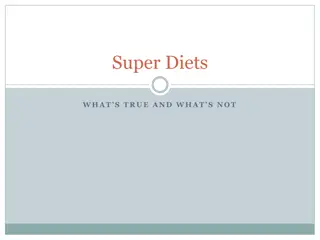Lifestyle and Diet Influence on Fertility and Pregnancy by Dr. Joo Teoh
Dr. Joo Teoh's research covers the impact of lifestyle and diet on fertility and pregnancy. It discusses the effects of age, BMI, smoking, alcohol, and weight loss interventions on reproductive health. The findings emphasize the importance of maintaining a healthy lifestyle for optimal fertility and successful conception.
Download Presentation

Please find below an Image/Link to download the presentation.
The content on the website is provided AS IS for your information and personal use only. It may not be sold, licensed, or shared on other websites without obtaining consent from the author.If you encounter any issues during the download, it is possible that the publisher has removed the file from their server.
You are allowed to download the files provided on this website for personal or commercial use, subject to the condition that they are used lawfully. All files are the property of their respective owners.
The content on the website is provided AS IS for your information and personal use only. It may not be sold, licensed, or shared on other websites without obtaining consent from the author.
E N D
Presentation Transcript
Lifestyle & Diet for Fertility & Pregnancy Dr Joo Teoh FRANZCOG MRCP(Ire) MRCOG MBBCh MSc(Lon) MD(Glasgow) SubspecialtyRepromed(UK)
Age & Fertility Other complications in pregnancy
Ideal BMI 20-25kg/m2 Hypopituitarism-hypogonadism BMI <18.5 High BMI Increased aromatization of androgens to estrogen in adipocytes Increased IGF-1 increased insulin hyperandrogenism Weight & Fertility Affecting both male and female Oligo-ovulation Erectile dysfunction Sperm quality Even in ovulating women, chance of conception is lowered in higher BMI women 10% reduction in success rates of IVF in overweight women
Retrospective cohort study in Stanford Uni. Med. Centre Benefit of Weight Loss in Fertility Mean BMI 33 Dietary and lifestyle intervention inc. metformin for dysglycaemia >10% weight loss higher conception (88% VS. 54%) Higher live birth rates (71% cs. 37%)
2x infertility rates in men & women Miscarriage OR 1.4 (95% CI 1.0-2.1) 10 cigarettes/day Smoking Affect semen parameters
Men Moderate drinking of no more than 2 standard drinks/day has not been shown to affect fertility Above that level semen quality affected Women Alcohol Low or moderate drinking of up to 14 servings/week has not been shown to affect fertility Most health agencies advise not to drink at all when trying to conceive as during early stages of pregnancy, babies may be vulnerable to the adverse effect of alcohol
Improves physical & mental health Maintain or lose weight Alleviating stress Shown to improve semen parameters Excessive exercise e.g. high intensity competitive sports training may cause hypopituitarism-hypogonadism Moderate exercise Men should not use androgens May cause azoospermia WHO 150 mins of moderate-intensity or 75 mins of vigorous- intensity aerobic physical activity spread throughout the week During pregnancy, 150 mins of moderate-intensity exercise improves the health of mum & baby
No consistent patterns Most research found no association Caffeine A few studies suggested linear effect of caffeine intake to male infertility Perhaps limit the amount to 200mg/day, equivalent to 2 mugs of instant coffee
Short term stress leads to poorer egg quality and IVF outcome Women reported higher stress level shown to have lower success rates in fertility treatment Uncertain roles of longer term stress, our body may cope Stress and support Support Close family and friends Support groups Relaxation activities
Diet- what to focus on? Vitamin D Antioxidants Good fats vs. bad fats Folic acid Soy Maybe good for women Is it bad for men Dairy Is full fat better?
Western Diet high in carbohydrates, red meats, processed meats, potatoes, sweets, and sweetened drinks results in lower quality semen parameters & fertilization rates Diet- what to focus on? Foods such as fish, seafood including shellfish, poultry, cereals, vegetables, fruits, has a +ve effect on the quality of sperm parameters
Females with the highest Med Diet Score have 66% lower chance of ovulatory disorders & 27% of other factors affecting their fertility The Mediterranean Diet- Is It the Answer? Women with higher Med Diet Score have better chance Clinical pregnancy (29.1% vs. 50%) Live birth (26.6% vs. 48.8%) Men with Med Diet Score 37 or more has the best semen quality in all parameters Up to 30% men with the lowest Med Diet Score has at least one suboptimal semen parameters
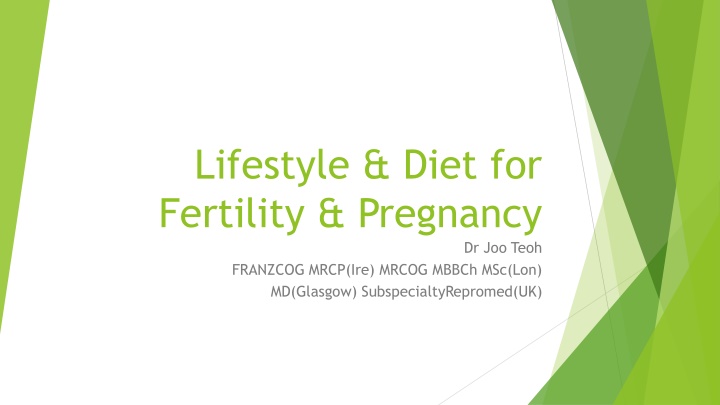

![READ [PDF] Dash diet Cookbook for beginners: 365 days of simple, healthy, low-s](/thumb/2057/read-pdf-dash-diet-cookbook-for-beginners-365-days-of-simple-healthy-low-s.jpg)
